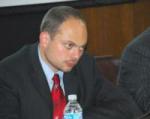Vladimir Kara-Murza
In Vladimir Putin’s mythology, the 1990s were a dark and shameful period, a time when Russia was on its knees before Western governments and greedy oligarchs. The official propaganda tone was set by Mr. Putin’s infamous 2007 speech at Luzhniki in which he demonized former Russian leaders for “acting against the state” and accused the pro-democracy opposition of “groveling at foreign embassies.” This line (which ignores the fact that, under Mr. Putin, the levels of corruption and lawlessness have far exceeded anything seen in the 1990s) is obligingly parroted by state-run television.
The only exceptions come during the short periods of mourning for the passing of those who led Russia during her first tumultuous years of independence. With deference to the old tradition — “of the dead, speak no ill” — TV channels tune down their propaganda and show archival news footage of the days when elections still mattered, when parliament was still a place for discussion, and when governments may have been unstable and weak, but never oppressive or purposefully cruel. So it was after the passing of former president Boris Yeltsin in 2007, so it was after the death of former prime minister Yegor Gaidar in 2009, and so it was last week, after the passing of Viktor Chernomyrdin, who led Russia’s government from 1992 to 1998 and was once considered a likely future president.
As with the passing of Mr. Yeltsin and Mr. Gaidar, Mr. Chernomyrdin’s death created a rare unity among opposites, with simultaneous condolences from regime officials and leaders of the opposition. It is hard to imagine a common cause between President Dmitri Medvedev and political prisoner Mikhail Khodorkovsky, yet both issued statements on the passing of the former prime minister — one from the Kremlin, the other from Matrosskaya Tishina prison. “I knew him as a decent and kind man — a rarity in modern politics”, Mr. Khodorkovsky wrote in his letter of condolence.
These qualities — magnanimity and the absence of petty vengefulness — are what many Russians, including democrats who never voted for Mr. Chernomyrdin’s party, recall today about the ex-prime minister. He was not a market reformer (indeed, when the former communist apparatchik and Gazprom chief replaced Mr. Gaidar as premier in 1992, liberals were terrified), nor was he a passionate champion for democracy. Russia would have been better served in the 1990s with a more ideologically committed prime minister. Yet Mr. Chernomyrdin embodied a very different era in Russian politics — and this is where most of the nostalgia of the last few days originates. The former premier was well known for his gaffes (among the most famous: “We wanted the best, but it turned out as usual” and “We will live so well that our children and grandchildren will envy us”), but he would never have giggled over the tragic death of Russian sailors (as Mr. Putin did) or told a journalist to get circumcised so that he will have “nothing growing back.” While Russia’s current rulers have no qualms about sacrificing the lives of children in order to avoid politically inexpedient talks with separatists (as Mr. Putin did in Beslan), Mr. Chernomyrdin put his job and reputation on the line by publicly negotiating with Chechen warlord Shamil Basayev in order to secure the release of hostages held in Budyonnovsk in June 1995. The premier was vilified in nationalist circles, but over a thousand lives were saved. In 1999, without regard for the rising anti-Western feelings in Russia, Mr. Chernomyrdin (then President Yeltsin’s special envoy for the Balkans) persuaded Yugoslav dictator Slobodan Milošević to accept NATO demands and withdraw his troops from Kosovo, avoiding a prolonged war.
Mr. Chernomyrdin’s presidential prospects were quashed (ironically, given what followed) by the democratic nature of the Russian political system of the 1990s. In August 1998, after the Asian financial meltdown and the historically low prices of oil (around $12 per barrel) led to the collapse of Russian markets and a government default, President Yeltsin decided to bring in an old hand to stabilize the situation, asking Mr. Chernomyrdin to return to the prime minister’s seat from which he was dismissed earlier that year. It was understood that he would return not just as prime minister, but as president-in-waiting, with increased executive powers and with a view to the 2000 election. Twice — first by a vote of 94–253, then by 138–273 — the State Duma (the lower house of parliament), dominated by left-wing opponents of the president, rejected Mr. Chernomyrdin’s nomination. The result was the appointment of Yevgeny Primakov — one of three former security service chiefs who would serve as Boris Yeltsin’s last prime ministers. The next two were Sergei Stepashin and Vladimir Putin.
“He was a real Russian muzhik,” wrote opposition leader Boris Nemtsov, who served as Mr. Chernomyrdin’s deputy prime minister from 1997 to 98. “He was experienced and, in a folksy sense, wise. He was also kind and sincere.” Today’s ruling elites in Moscow have no leaders of such caliber.

